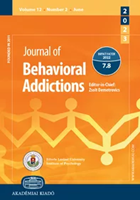Psychological intervention for gambling disorder: A systematic review and meta-analysis
Psychological intervention for gambling disorder: A systematic review and meta-analysis
Author(s): Jakob W. Eriksen, Anne Fiskaali, Robert Zachariae, Kaare B. Wellnitz, Eva Oernboel, Anna W. Stenbro, Thomas Marcussen, Marie W. PetersenSubject(s): Individual Psychology, Social psychology and group interaction, Personality Psychology, Behaviorism, Substance abuse and addiction
Published by: Akadémiai Kiadó
Keywords: gambling disorder; pathological gambling; psychological intervention; psychotherapy; systematic review; meta-analysis;
Summary/Abstract: Increasingly, gambling features migrate into non-gambling platforms (e.g., online gaming) making gambling exposure and problems more likely. Therefore, exploring how to best treat gambling disorder (GD) remains important. Our aim was to review systematically and quantitatively synthesize the available evidence on psychological intervention for GD. Methods: Records were identified through searches for randomized controlled trials (RCTs) evaluating psychological intervention for GD via six academic databases without date restrictions until February 3, 2023. Study quality was assessed with the revised Cochrane risk-of-bias tool for randomized trials (RoB2). Primary outcomes were GD symptom severity and remission of GD, summarized as Hedges’ g and odds ratios, respectively. The study was preregistered in PROSPERO (#CRD42021284550). Results: Of 5,541 records, 29 RCTs (3,083 participants analyzed) were included for meta-analysis of the primary outcomes. The efficacy of psychological intervention across modality, format and mode of delivery corresponded to a medium effect on gambling severity (g 5 0.71) and a small effect on remission (OR 5 0.47). Generally, risk of bias was high, particularly amongst early face-to-face interventions studies. Discussion and conclusions: The results indicate that psychological intervention is efficacious in treating GD, with face-to-face delivered intervention producing the largest effects and with strongest evidence for cognitive behavioral therapy. Much remains to be known about the long-term effects, and investigating a broader range of treatment modalities and digital interventions is a priority if we are to improve clinical practice for this heterogeneous patient group.
Journal: Journal of Behavioral Addictions
- Issue Year: 12/2023
- Issue No: 3
- Page Range: 613-630
- Page Count: 18
- Language: English

